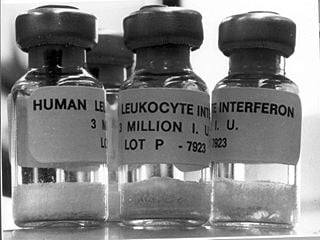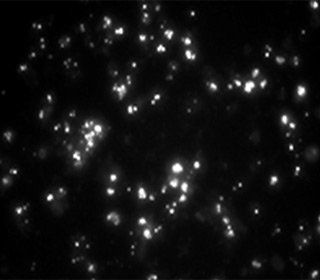
Researchers in the St. Giles Laboratory of Human Genetics of Infectious Diseases at Rockefeller University have recently published the results of a study that demonstrates how organs like the brain have their own defense systems which, when disrupted, can permit disease despite a healthy white blood cell count. The key is the production of interferon, which are proteins triggered by a receptor called TLR3 that send up the alarm to fight infection (by interfering with the pathogen's reproduction). When that TLR3 receptor is faulty on a neuron or other brain cell, no interferon is produced and the patient can suffer a disease of the brain even though that same pathogen is being combatted effectively in other parts of the body. We now know there seem to be localized systems of immune response within specific organs, and that interferon therapy may help patients with rare localized diseases.
[Image courtesy of Wikimedia Commons]
In the Rockefeller study conducted in the St. Giles Laboratory of Human Genetics of Infectious Diseases of Dr. Jean-Laurent Casanova, M.D., Ph.D, researchers focussed their attention on children with a rare case of brain encephalitis caused by the herpes simplex virus (HSV-1). They knew from earlier work that these same children had defects to their brain TLR3 receptor. According to team member and clinical scholar Dr. Shen-Ying Zhang (right) from a Rock news release:
.jpg?width=178&height=178&name=rockefeller_research_scholar_(2).jpg) “One interesting thing about these patients is that they didn’t have any of the other, more common herpes symptoms. They didn’t have an infection on their skin or their mouths, just in their brains. We therefore hypothesized that the TLR3 response must be specifically responsible for keeping the herpes virus from infecting the brain and not necessary in other parts of the body."
“One interesting thing about these patients is that they didn’t have any of the other, more common herpes symptoms. They didn’t have an infection on their skin or their mouths, just in their brains. We therefore hypothesized that the TLR3 response must be specifically responsible for keeping the herpes virus from infecting the brain and not necessary in other parts of the body."
[Photo courtesy of Rockefeller University Clinical and Translational Science Center]
Through a collaboration with Harvard Medical School researchers, Dr. Zhang and her colleagues created central nervous system cells from induced pluripotent stem cells cultured from patients' individual tissues (that included the TLR3 defect). When they introduced the HSV-1 into the specialized cell culture, it was able to reproduce, meaning that the interferon response was hampered. When they introduced the same HSV-1 into the same patients' blood in the lab, the interferon response summoning white blood cells was normal and the virus was attacked.
[Image shows herpes simplex virus-infected neurons from patients with a genetic defect that impairs their brain’s ability to make interferon, leaving their brain cells unable to fight off the infection. Courtesy of Newswire press release and the Casanova Lab.]
This research study is part of a the larger project of the St. Giles lab looking at single-gene defects ("monogenic holes") as the cause of specific diseases, especially in children. Dr. Casanova has five 2012 NIH grants totaling $2.7M. He joined the Rockeller research faculty in 2008; Dr. Zhang followed him there to continue research initiated in Paris as part of the Laboratory of Human Genetics of Infectious Diseases founded by Dr. Casanova and colleague Laurent Abel.
Biotechnology Calendar, Inc. is a full service event marketing and planning company producing on-campus, life science research tradeshows nationwide for the past 20 years. We plan and promote each event to bring the best products and services to the best research campuses across the country. Twice annually we hold our popular Rockefeller BioResearch Product Faire™ events on the Rockefeller University Campus in New York City. The upcoming spring event will be held on March 28, 2013, with the fall show taking place October 2, 2013. See our complete 2013 Show Schedule here.
For information on exhibiting, click the button below:



